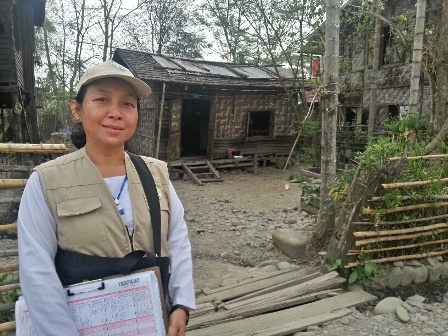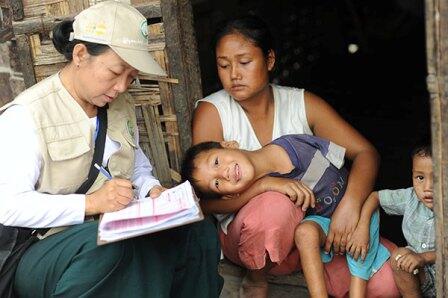At first glance eight year-old Lalremurata appears to be a normal little boy, who seems to spend most of his time wrestling with his two younger brothers, aged 4 and 5. He shrieks with joy as he stumbles to regain his balance, ready for another round of play fighting.
But a closer look shows that Lalremuata is severely disabled: he was born without arms, and needs medical attention that his parents cannot afford.
Lalremurata’s 29 year-old mother, Vanneihmawii, struggles to put food on the table for her family and often has to borrow money to make ends meet. The family survives on 2000 kyats or less than $2 a day.
“We can barely pay the rent,” she says. “The house is not good for the children, especially Lalremurata as he needs special care, but at the moment it’s all we can afford.”
Both parents are casual labourers and do odd jobs, but work is scarce. They have had to forego medical care for Lalremurata, who attends regular school, as there is no special needs school in his neighbourhood.
“Maths is my favourite subject in school,” Lalremurata says. He wants to be a carpenter when he grows up, “so I can build a better house for my family.”

“The teachers dare not scold him as he is disabled and he has had to repeat first grade. Because he is severely disabled, the teachers have built for him a special table and chair so that he can learn to write using his feet. Sometimes one of the teacher’s will come to the house to give him special classes,” says Vanneihmawii.
“I hope the census will lead to a better future for us,” she concludes.
Once the data collection is complete and the country’s needs are identified, there are expectations that it will help bring much needed development, including better access to health care in rural and low-income areas as well as improved educational opportunities for children with disabilities.
Daw Mang Nuam Ciin, a 50-year-old primary school teacher who speaks Chin dialects Falang, Tedim, Mizo as well as Burmese, was the enumerator who conducts the census interview at Lalremuata’s household. It is the last on her list to be enumerated for the day. She has already counted 110 households since the census began and has only 18 left.
“The census is very important. I hope the results will be useful for the township, but also for families and individuals. A census has not been done in over 30 years and we need data so the Government can improve social services, heath and education,” she says.
During the enumeration she has met many families living in poor conditions similar to Lalremurata’s. “I feel sorry for them and I hope the census will help improve their lives.”


